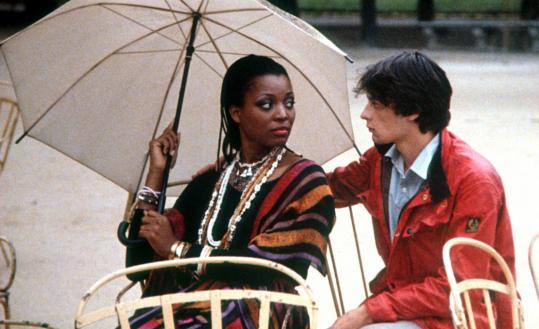
Set in the Paris of the early 80s, Diva is the story of moped riding postie Jules and his obsession with opera singer Cynthia Williams. The film begins with Cynthia (played by real life opera singer Wilhelmenia Wiggins Fernandez) performing a stunning rendition of the main aria from Catalini's "La Wally". After bootlegging a recording of this performance (Cynthia forbids live recordings as it is against her art) and stealing her gown, Jules finds himself in the middle of a plot involving the murder of a prostitute, a drug trafficking ring, a C90 tape incriminating the villains, and a pair of strange Taiwanese businessmen who are after the tapes he has made.
Diva is very much a film of it's era. Released almost 30 years ago, it's actually aged very well, which is surprising considering that at times it resembles an extended 80s pop promo. At the time it heralded a new era of French New Wave - the "Cinema of Look", and the empahasis of the film is most definitely on image, art direction and mise en scene. A romantic walk at dawn through Paris is beautifully shot in natural light to the tune of a touching piano melody. Jules's bare flat where he lives and dreams of opera is decorated only with giant pop art murals and mashed up cars. The scenes featuring the menacing (and slightly comical) villains strutting through the Parisian streets are accompanied by a fashionable disco-punk soundtrack.
The style over substance is most readily apparent in the scenes featuring Jules's existentialist recluse friend Gorodish, enigmatically played by Richard Bohringer. In his arty loft appartment he sits in his bath smoking cigars whilst listening to ambient music and contemplating the waves whilst a tank of water tilts from side to side and a jumbo jigsaw puzzle lays unfinished on the floor.
What saves all of this from being a complete pretentious mess is that writer/director Jean-Jacques Beiniex knows when to stick his tongue firmly in his cheek, and it's to his credit that the plot holds up under the weight of the imagery with some genuinely comic touches. You can definitely see Diva's influence in the movies of both Ridley and Tony Scott, in look if not in content, and Michael Mann along with his contemporaries Luc Besson and Leo Carax who directed Les Amants du Pont-Neuf.
Beiniex went on to make the art house smash Betty Blue but after that went off on his own artistic tangent and as a result his movies became marginalised by the film business and critics alike. To be fair, he has rarely hit the hights of Diva since. A telling line in the movie comes when Cynthia is asked why she refuses to make recordings of her voice.
“It is up to commerce to adapt to art, and not art to adapt to commerce" she replies - an accurate summary of Beineix's career for sure.
Watch Jules and Cynthia stroll through Paris at dawn here...
No comments:
Post a Comment